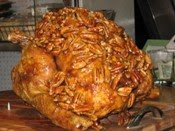This article first appeared in the New York Times Blog
Deep-fried turkey has been hailed as the solution to a perennial problem of Thanksgiving: a dried-out roast turkey.
Deep-fried turkey is juicy and quick. Emeril Lagasse and Martha Stewart have endorsed it. 
The turkey fryers — which combine gallons of boiling oil, open propane gas fires and often unstable frames — can easily become flame throwers, fire safety experts say.
Because of the number of fires and burns, national fire safety groups essentially urge people not to fry turkeys. The city’s Fire Department has issued a warning about turkey fryers. And Underwriters Laboratories, a nonprofit group that gives safety certifications for everything from hair dryers to space heaters, has refused to put its UL saftey mark on any deep turkey fryer.
“There are no UL listed turkey fryers because the turkey fryers on the market do not have the level of safety features we deem necessary,” said John Drengenberg, a spokesman for UL.
Most turkey fryers are essentially a large pot over sitting on a frame over an open propane flame, he explained. Most don’t have thermostat controls, and there are situations when the hot oil can spill over into the fire. “Then you’ve got something like a vertical flame thrower in your hands,” he said.
To highlight the hazards, UL has made a video starring Mr. Drengenberg, who was leery when the cameraman told him to stand closer to the deep fryer.
A common problem is that people misjudge the amount of oil needed, not allowing room for the turkey to be placed inside. But even when the oil is at the right level, a partial frozen turkey can also cause hot oil to spew a jet of fire.
“When a turkey is still partially frozen, that means there is still ice under the skin of the turkey,” Mr. Drengenberg said.
The ice turns to water and then to steam, and the only way that it can escape is by becoming a bubble in the hot oil. “It will blow out of the turkey fryer and takes hot oil with it,” he said.
The oil then often splashes down into the fire below. (Thawing in a refrigerator takes about 24 hours for every five pounds of turkey.)
He said that manufacturers have approached them about the certification, but UL has been clear that the fryers will not get certification unless they change significantly. Mr. Drengenberg did note that some manufacturers have been using sturdier frames, which are less likely to tip over.
Of course, even Mr. Drengenberg acknowledged that fried turkey tastes great. “Our recommendation is go to a restaurant that serves fried turkey,” he said. “They have bigger turkey fryers. They are experts. They are professionals.”
Indeed, Jive Turkey in Brooklyn was created with that mission in mind, said Arika Westbrooks, the 37-year-old founder, who started frying turkeys in her backyard.
“It was illegal — I don’t know I realized it at the time,” she said. “When I started doing this, I wanted a way to make it safe to get fried turkey.”
For the past five years, she has been serving deep-fried turkey all year around, with flavors like cajun, Jamaican jerk, buffalo and lemon pepper.
“They come out juicy and moist. It’s almost a velvety texture,” she said.
While she sells deep-fried turkey all the time in the form of turkey sandwiches, single wings, and single legs, Thanksgiving is the restaurant’s peak season, with approximately 4,000 turkeys sold for the holiday. The price for a turkey jumps to $75.50 and up, from $53.50, for the holidays.
To meet the demand, Ms. Westbrooks ramps up her staff from around five to 20 and keeps the kitchen open for 24 hours a day for a week with 12-hour morning and evening shifts. Each turkey takes 18 to 24 minutes to fry, a fraction of the roasting time for a turkey.
About 40 percent of their sales are now outside New York. Jive Turkey ships fully fried — refrigerated, not frozen, because that changes the flavor, she said — turkeys by overnight delivery. The turkeys are placed in a foam cooler and include a special bag to reheat the turkey in the oven, without drying it out.
Ms. Westbrooks said that a deep-fried turkey is good refrigerated for about four days, so people can come early. But the peak is on Thanksgiving Day, when doors open on at 9 a.m. They don’t take advance orders. “It’s on a first-come, first-served basis,” she said.
The store officially closes at 3 p.m., though they continue cooking away to serve all the customers who have arrived at that point. “We figure if by 3 o’clock if you haven’t figured out where you are getting your turkey on Thanksgiving Day, you might not be,” she said.
Then the Jive Turkey workers go home for their own Thanksgiving dinners (fried turkey, of course).
She added, “We are not open the day after Thanksgiving.”


No comments:
Post a Comment